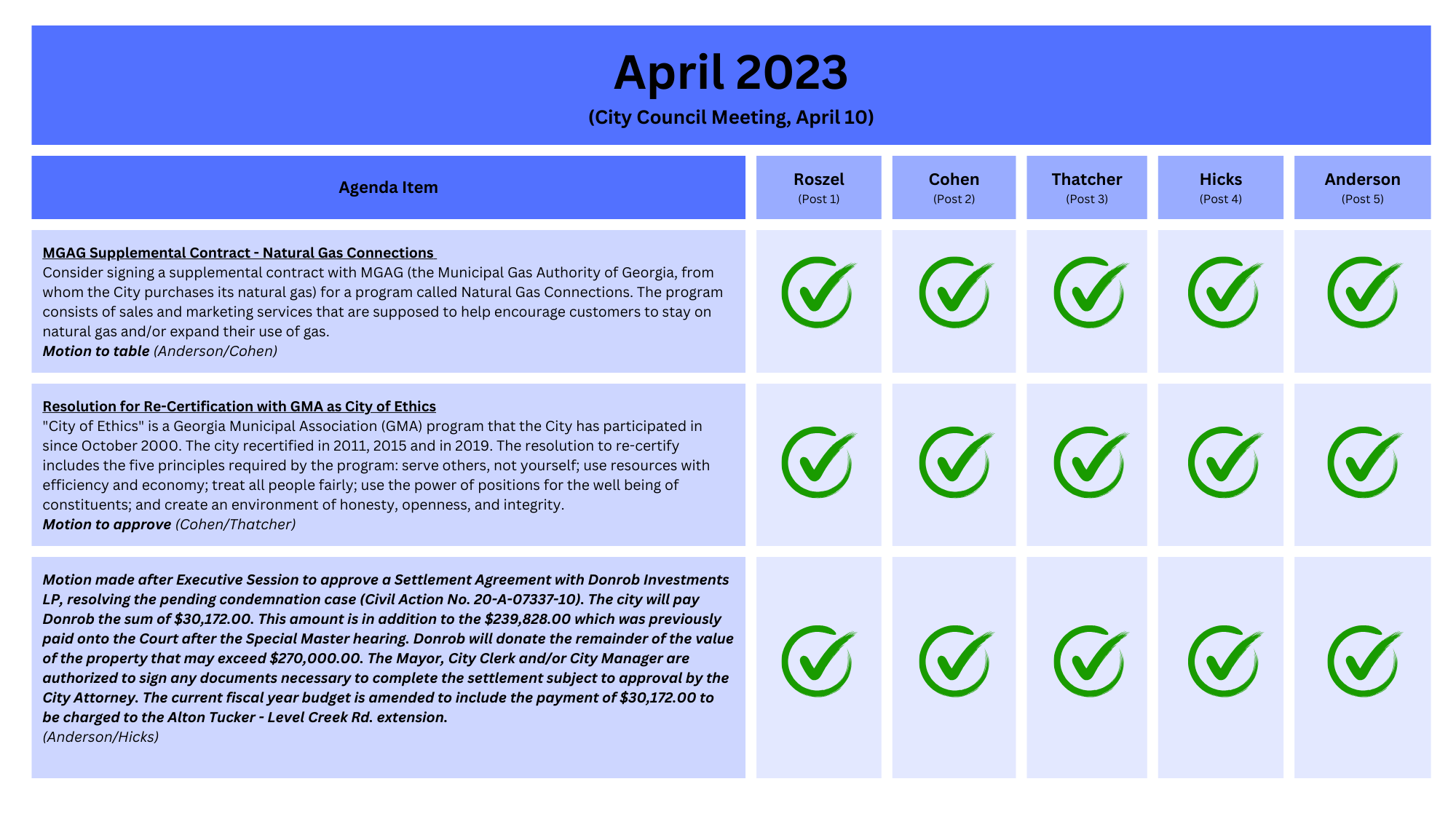For the past two years, the City Council has voted on 130 agenda items. They’ve considered multimillion-dollar contracts, multimillion-dollar bonds, more than $3 million in real estate purchases, annexation and rezoning of properties, a variety of variances, and multiple amendments to City ordinances.
What they rarely consider is voting differently than the rest of their group. Only five (5) of those 130 votes were divided, and all of those happened more than a year and a half ago. Month after month, your elected officials show up, ask almost nothing, debate absolutely nothing, and vote in mindless lockstep on almost every issue.
Out of those 130 votes, 110 were votes to approve the item. They actually voted more times to table something (13) than they did to deny something (7).
If you’ve ever tried to plan a group lunch at your office, you saw more debate than I’ve seen in the four and a half years I’ve been observing the City Council meetings in Sugar Hill.
The City likes to complain that I don’t provide “context.” Here’s the context.
These unanimous votes are never debated, a fact I’ve written about numerous times over the years. Soon-to-be Former Council Member Marc Cohen took it upon himself to champion the no-debate cause. He offered the excuse that the Council meetings used to be contentious, but now they’re all “friends.”
I have hammered them publicly and repeatedly for failing to ask questions publicly during discussions. In response to that criticism, a few of them started asking questions, but the questions are rarely meaningful. Council Member Mason Roszel had a unique gift for relating everything to the Greenway so he could ask a question without getting into anything very controversial.
They still consistently fail to ask questions at all during the budget and millage rate hearings, which are arguably the two most important issues the City votes on each year.
They frequently claim that they asked all their questions of staff prior to the meeting. It’s inefficient to have all six (6) elected officials hammering staff with questions individually prior to the meeting instead of just letting staff present to everyone and take questions during the public meeting. That’s wasting staff time, which is expensive and getting more expensive with each yearly 5% pay increase that the Council rubber stamps.
Sometimes, they add conditions to planning and zoning cases. Again, those are rarely substantive. They generally add requirements that the development “substantially resemble” the submitted plans. They also often require that the roads and rights of way be privately owned, which doesn’t mean much since the developers apply to have the City take them over once the development is complete and the City rubber stamps their approval. My favorite is the omnipresent condition to put three gas appliances in every unit.
These tidbits are sometimes in the Meeting Minutes provided by the City to give the impression that there are weighty discussions and serious questions. But, the votes are what really matter, and they speak for themselves.
If these politicians think all their bluster is important, they could livestream meetings and/or put recordings out there for public view. I’ve asked them to do this multiple times and they consistently refuse. Although they’ve offered some lame excuses, the fact is that other cities and Gwinnett County do this. It can be done. The City spends a lot of money on things that matter less. The political hacks in Sugar Hill are either afraid of being embarrassed by the discussions, or agree with me that they don’t matter.
The rare divided votes also feature no debate, and are strangely inconsistent. As a result, they usually seem just as choreographed as the lockstep approvals. Here are all five (5) divided votes from the past two years.
The most recent divided votes were related to an all-rental subdivision on Sycamore Road. There was considerable opposition from the neighbors, and I wrote about it multiple times. Finally, the developer contacted me privately and I published her note, along with the question of whether she had reached out to the Council privately in the same way.
Cohen and Anderson still moved to approve the development, but Thatcher, Hicks, and Roszel voted against approving it. There was some whispering between the Mayor and the City Attorney at that meeting, followed by an announcement that simply voting against approval wasn’t enough.
Rather than take another vote at that same meeting, the Council kicked the can down the road, tabling the item in May. In June, they finally voted. Roszel initially moved to deny without prejudice, then decided to correct himself with a much weaker motion to withdraw without prejudice. This would have allowed the developer to approach the City with the development again without a waiting period. The entire thing made no sense and reeked of politics.
In December 2021, Council Member Taylor Anderson actually moved to deny a 252-unit apartment complex at Peachtree Industrial and Price Road. Although there was no debate, there was some conversation on that one, interestingly, about traffic. The Planning Director, who isn’t exactly an independent entity at City Hall, had cited that concern in his report. He also proposed a condition that the developer provide written notification to the school board of the number of units. It’s interesting that one 252-unit complex was feared to create such a burden on traffic and schools when we’re now being told by the City that seven apartment complexes in “Downtown” will not.
In December 2021 and June 2022, there were divided votes related to townhouse developments in the City, with the then-newest members of the Council breaking ranks to vote against townhomes. Later, they would both vote against a townhouse community across from Arbor Clos in a unanimous vote with the rest of the Council.
Both also voted with the rest of the Council to approve three other townhouse complexes in Sugar Hill with a total of 237 units, including one 125-unit development on Highway 20 where every townhouse was proposed as a rental. They never indicated why the ones they denied were so much more objectionable than the ones they approved.
At best, these voting habits are lazy and cowardly. At worst, they indicate serious corruption. Either there are a lot of private discussions to orchestrate votes in advance, or standing orders regarding voting expectations are issued early on.
Georgia law requires these meetings to be open so people can see what their elected employees are doing. The list of topics that can legally be discussed behind closed doors in Executive Sessions is pretty short, and the law says it is to be construed narrowly. These people are hiding like a bunch of sasquatches.
As we approach the conclusion of the 2023 Election Year with the runoff on Tuesday, December 5, anyone who’s not in that small circle of political “friends” with whom these hacks are singularly concerned needs to take notice. As long as this current clique maintains a majority on the Sugar Hill City Council, they will work together to vote for themselves and their friends, at your expense.
City Council Voting Records from the Past Eight Months…
(For the complete list, see:
https://realdealsugarhill.substack.com/p/city-council-vote-tracking)

















